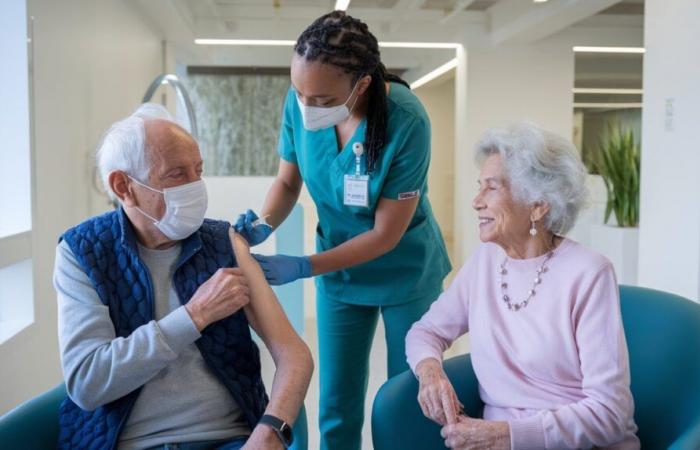France is strengthening its strategy to protect seniors. For two months, people over 65 have been invited to be vaccinated against two potentially serious diseases: respiratory syncytial virus (RSV) and shingles.
This new measure, effective since September 2024, aims to reduce the risks of respiratory infections and age-related complications.
Deciphering these new recommendations which are a game-changer for our seniors.
RSV: a little-known danger for the elderly
Respiratory syncytial virus, often associated with childhood infections, actually poses a serious threat to older adults. Here's what you need to know about this virus and the new vaccine:
What is RSV?
The VRS is a virus that attacks the respiratory tract. In older people, it can cause:
- Severe respiratory infections
- Potentially fatal complications
- An increase in hospitalizations during the winter period
Why vaccinate seniors?
People over 65 are particularly vulnerable to RSV. The statistics speak for themselves:
- 78% deaths linked to RSV in France affect this age group
- People with chronic or heart conditions are even more at risk
The anti-RSV vaccine: practical arrangements
Two vaccines have received marketing authorization:
These vaccines are now available and reimbursed by Health Insurance. Here's what to remember:
- Price: approximately 200 € per dose
- Frequency: one dose per year
- Reimbursement: covered by Health Insurance
Shingles: increased risk with age
Shingles, this painful disease that reactivates the chickenpox virus, particularly affects the elderly. The new compulsory vaccine aims to reduce its incidence and complications.
Shingles in brief
Shingles is characterized by:
- Painful rashes
- Intense, sometimes persistent pain (postherpetic neuralgia)
- Increased risk of complications among seniors
Vaccination against shingles: what you need to know
The shingles vaccination schedule for those over 65 is as follows:
- Two doses to administer
- Two month interval between doses
- Price: between 150 et 200 € per dose
- Reimbursement: 100% covered by Health Insurance in certain establishments
Why make these vaccines compulsory?
The decision to impose these vaccinations on seniors is based on several factors:
Increased vulnerability
As we age, the immune system weakens, making older people more susceptible to infections. This vulnerability results in:
- Higher risk of serious complications
- More frequent hospitalizations
- A higher mortality rate for certain infectious diseases
The proven effectiveness of vaccination
Vaccines against RSV and shingles have demonstrated their effectiveness in:
- Reduce the risk of infection
- Reduce the severity of symptoms in the event of illness
- Preventing life-threatening complications
A collective benefit
Beyond individual protection, vaccination of seniors contributes to:
- Limit the spread of viruses in the general population
- Indirectly protect unvaccinated or more vulnerable people
- Reduce pressure on the health system, particularly during winter
Other vaccinations recommended for seniors
In addition to the new RSV and shingles vaccines, other vaccinations remain essential for older adults:
The DTP trio: Diphtheria, Tetanus, Poliomyelitis
These well-known vaccinations require regular boosters:
- Reminders at 25, 45 and 65 years old
- After 65 years, a reminder every ten years
It is crucial not to neglect these vaccines, even in old age, because these diseases can have serious consequences in older people.
Seasonal flu
Although not mandatory, the flu vaccine is strongly recommended for seniors. It is generally offered every year as winter approaches.
The pneumococcus
Vaccination against pneumococcus is recommended for people at risk, including many seniors. It protects against certain forms of pneumonia and invasive infections.
How to get vaccinated?
To facilitate access to these new vaccinations, several options are available to seniors:
At the attending physician
The general practitioner remains the first contact for:
- Assess health status and vaccination needs
- Prescribe the necessary vaccines
- Administer vaccines or refer to a vaccination center
In pharmacy
Many pharmacies are now authorized to vaccinate. They can:
- Deliver vaccines on prescription
- Administer certain vaccines directly on site
In vaccination centers
These specialized structures offer:
- Access to all recommended vaccines
- Personalized advice
- 100% coverage for certain vaccines
The challenges of implementing this new vaccination policy
The introduction of these new compulsory vaccines raises several questions:
Acceptance by the population
Despite the proven benefits, some seniors may be reluctant to receive new vaccines. The reasons can be multiple:
- Fear of side effects
- Lack of information on these new diseases
- Feeling tired of multiple recommended vaccinations
Distribution logistics
Ensuring the availability of vaccines for all affected seniors represents a significant logistical challenge:
- Sufficient supply of vaccines
- Training of medical staff in new protocols
- Implementation of effective information campaigns
The cost to society
Although beneficial in the long term, this new vaccination policy represents a significant investment:
- Cost of vaccines covered by Health Insurance
- Expenses related to awareness campaigns
- Training of health personnel
Future prospects for senior health
The introduction of these new compulsory vaccines marks an important step in the management of the health of the elderly. It opens the way to new reflections on the protection of this vulnerable population:
Towards a more global approach to senior health
This initiative could encourage:
- The development of new vaccines specifically targeting diseases of old age
- Better consideration of the specific needs of seniors in public health policies
- Strengthening prevention and screening programs adapted to this age group
The importance of continued research
The constant evolution of medical knowledge highlights the need to:
- Continue studies on the long-term effectiveness of these new vaccines
- Monitor for rare side effects
- Adapt recommendations based on new scientific data
Ultimately, this new vaccination policy for seniors demonstrates an increased desire to protect a particularly vulnerable population. It raises important questions about the balance between collective protection and individual freedom, as well as the capacity of our health system to adapt to the challenges of an aging population. The future will tell us how these new measures will concretely impact the health and quality of life of our seniors.






